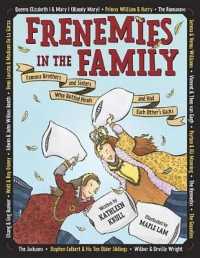- ホーム
- > 洋書
- > 英文書
- > Performing Arts
Full Description
This book examines Brecht's theory and method of adaptation. It first reconstructs it into a single framework using four key Brechtian concepts: Fabel, gestus, estrangement effects, and historicizing. It then uses that framework to analyse four Brechtian adaptations: The Tutor, Don Juan, "Socrates Wounded," and Kriegsfibel. It argues that adaptation occupies a previously unrealised central place in Brecht's thought, demonstrating that he provides us with a unique way to think about adaptation—as material transformation. It concludes by describing how Brecht is useful for anti-capitalist aesthetics today because through him one can foster a new consciousness which enables better social conditions to be created. This book is practical for both theatre practitioners and artists as well as theorists.
Contents
Acknowledgements
List of Figures
1 Why Brecht and Why His Adaptations?
1 Introduction
2 A Vexing Quirk in Brechtian Scholarship and the Weaponization of Art-Philosophy
3 A Lost Revolution
4 Weaponization
5 Objectives, Research Question, and Contribution
6 Overview of Book
2 Brecht's Theory and Method of Adaptation
1 Brecht's Politics
2 Marxism's Impact on Brecht's Work
3 Marxism's Impact on Brecht's Biography
4 Problems with the Bourgeois Theatrical Heritage
5 Brecht on the Bourgeois Ideology
6 Making Conscious Experience Possible
7 Conscious Experience and the Classics
8 The Fabel and Gestus
8.1 Gestus
8.2 Social Gestus
8.3 Gestus in Text
8.4 The Fabel and Adaptation
9 Adaptation and Estrangement Effects
10 Historicizing and Intertextual Discourse
10.1 Historicizing
10.2 Intertextual Discourse
11 Praxis and Experimentation
11.1 Praxis
11.2 Experimentation
12 Summary
3 Freedom and Alienation in Brecht's The Tutor
1 Introduction
2 Synopsis of Lenz's The Tutor
2.1 Act i
2.2 Act ii
2.3 Act iii
2.4 Act iv
2.5 Act v
3 Interpretive Summary of Brecht's The Tutor
3.1 Prologue
3.2 Act 1
3.3 Act 2
3.4 Act 3
3.5 Interlude
3.6 Act 4
3.7 Act 5
3.8 Epilogue
4 Summary
4 Conquest and Magical Thinking in Brecht's Don Juan
1 Introduction
1.1 A Transferable Method
1.2 Chapter Overview
2 Summary of Molière's Don Juan
2.1 Act i
2.2 Act ii
2.3 Act iii
2.4 Act iv
2.5 Act v
3 Interpretive Summary of Brecht's Don Juan
3.1 Act i
3.2 Act ii
3.3 Act iii
3.4 Act iv
4 Summary
5 Courage and Action in Brecht's "Socrates Wounded"
1 Introduction
2 Summary of Plato's Socrates at Delium
2.1 The Unity of the Virtues and Courage as Wisdom
2.2 Courage in the Laches
2.3 Courage in the Apology
3 Interpretive Summary of "Socrates Wounded"
4 Summary
6 War and Capitalism in Brecht's Kriegsfibel
1 Introduction
1.1 The Photos and Layout of the Kriegsfibel
1.2 Epigrams in the Kriegsfibel
2 Fabel in the Kriegsfibel
3 Estrangement in the Kriegsfibel
3.1 Cutting and Pasting as Estrangement
3.2 Estrangement in the Text-Pictorial Interface
3.2.1 The Verbal and the Visual
3.2.2 Elevated Poetic Diction and Prosaic Imagery
3.3 Estrangement through Visual Flow
4 Gestus in the Kriegsfibel
5 Kriegsfibel Analysis
5.1 Non-linear Narrative Structure
5.2 Ideological Underpinnings
5.2.1 Photo-Epigram 28 and the Gestus of Being Mesmerised
5.2.2 Photo-Epigram 51 and the Gestus of Being Blind
5.2.3 Photo-Epigram 8 and the Gestus of Keeping an Eye Out
5.2.4 Photo-Epigram 33 and the Gestus of Going up in Smoke
5.2.5 Photo-Epigram 15 and the Gestus of Fear
5.3 Material Interests
5.3.1 Photo-Epigram 5 and the Gestus of Shooting the Bird
5.3.2 Photo-Epigrams 37 and the Gestus of Lusting After
5.3.3 Photo-Epigram 44 and the Gestus of Remembering the Dead
5.4 What Happens Next?
5.4.1 Photo-Epigrams 58 & 64 and the Gestus of Hanging Your Head in Defeat
5.4.2 Photo-Epigram 69 and the Gestus of Fascism
5.4.3 The Gestus of Learning and Historicizing
6 Summary
7 Brecht's Theory and Method of Adaptation and Anti-capitalist Aesthetics Today
1 Summary
2 Making Brecht Whole
2.1 Contribution to Brechtian Scholarship
2.2 Contribution to Adaptation Studies Scholarship
2.3 Contribution to Anti-capitalist Aesthetics Today: Is Brecht Still Useful?
2.3.1 Utility of Gestus
2.3.2 Utility of Estrangement Effects and Historicizing
2.3.3 Utility of Fabel
2.3.4 Utility of Brecht's Theory and Method of Adaptation
2.3.5 Utility of Theory-Praxis
3 Conclusion
4 In(conclusion)
Index








